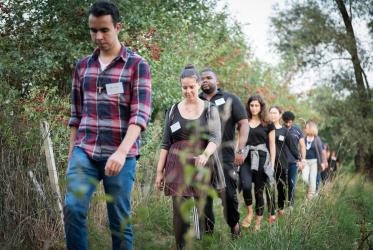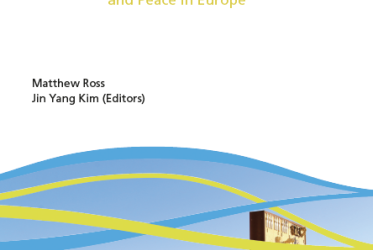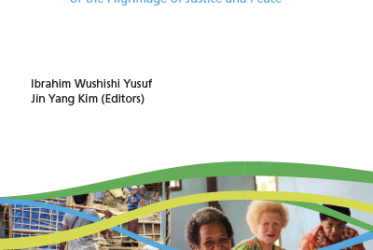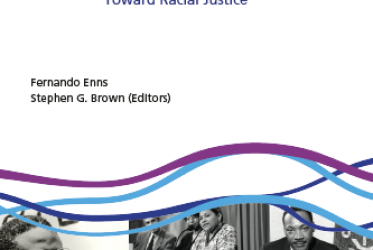The Pilgrimage of Justice and Peace has been forced to change, like so many things, during the COVID-19 pandemic. How do we maintain the essence of the pilgrimage even as we change the process?
Dr Phiri: The major change has been the change from face-to-face Pilgrim Team Visits to online ones. In 2020 the Pilgrimage of Justice and Peace theme was “Caring for People, Water, and Earth” with a focus on the Pacific. We were able to still have face-to-face visits with churches and ecumenical partners in January 2020 in Fiji. Thereafter, we had to cancel Pilgrim Team Visits to the rest of the Pacific due to COVID-19 travel restrictions.
By June, we discovered we are able to do much more online than anticipated. We then began to plan a hybrid Women of Faith Pilgrim Team Visit to South Korea, which took place 13-15 July 2020 under the theme “The Korean War and Women’s Life: The Journey Towards Peace and Reconciliation.” The pilgrimage comprised more than 30 women gathering online from Women Cross DMZ, Ecumenical Forum on Korea, UN Ecumenical Women, Presbyterian Women, the Pilgrimage of Justice and Peace Reference Group and other international ecumenical partners, while local people met in groups in South Korea. The international women represented eight nationalities from four continents and five different time zones. They were there to listen and accompany Korean church women who gathered in person in Korea as they called for an end to patriarchy – manifested in the Japanese colonization of Korea and the establishment of ‘comfort women’ and also in the Korean War — and to the resulting pain and injustice that remains a grim daily reality for many today.
The group was moved by stories of sexual abuse and slavery, the by-product of militarization and its traumatic impact on survivors and their children, and of the efforts of the women in restoring dignity to those who have been ostracized by the wounds of the past and the present. The group concluded the pilgrimage by watching and supporting a demonstration by the group Justice for the Comfort Women to make clear the deep wounds from sexual slavery.
The Pilgrim Team Visit was so successful so that we chose that to be the methodology for Pilgrim Teams Visits while we are in lockdown in 2021.
The Pilgrimage of Justice and Peace focus for 2021 is North America and the theme is indigenous peoples and racism with visits including Standing Rock, the Arctic Circle, Minnesota, Winnipeg, Toronto/Six Nations, Charleston, Ferguson and Chicago.
The whole solidarity visits are online. Storytelling has been used to lift the impacts and challenges faced by indigenous communities and those who are victims of racism. I participated in the Arctic Circle Pilgrim Team Visits. The storytelling was a very powerful method of communication. There were more international reference and working groups that joined, which could not have been the case with physical visits. It is my prayer that those who ‘visited’ and those who were ‘visited’ felt that the unity of member churches and ecumenical partners has been strengthened through the theological reflection and intersectional approach of the four themes of Pilgrimage of Justice and Peace: truth and trauma, land and displacement, gender justice, and racial justice.
How do we cultivate a grassroots relationship with the global ecumenical fellowship? Has the original methodology of the Pilgrimage of Justice and Peace led us there?
Dr Phiri: Still operating within the limitations of COVID-19 restrictions, I have found that reaching out to the regions through partnering with the regional ecumenical offices to be an effective way of keeping the spirit of the Pilgrimage of Justice and Peace alive. I have participated in the African and European consultations on the Pilgrimage of Justice and Peace in the context of COVID-19. We listened to powerful testimonies of young people on the challenges of mental health during the COVID-19 lockdown. Our hope is that these conversations will inspire the fellowship to organise their own local spaces where the conversations can continue.
What are the biggest lessons you’ve learned along the way?
Dr Phiri: The biggest lesson is that COVID-19 has emphasised the pilgrimage is not only about walking together physically but sustaining conversations and praying together. I have also learnt through COVID-19 that health and healing should be added to the four themes. The WCC fellowship, as frontline workers, needs to have a strategy of how to deal with any future pandemics.
The invitation to join the pilgrimage is open. But how do we speak to people in communities who want to join but don’t know how?
Dr Phiri: At its 10th Assembly at Busan, Korea, in 2013, the WCC invited Christians and all people of good will to join a Pilgrimage of Justice and Peace as a coordinated embodiment of the vision and spirit of Just Peace, working together to heal a world filled with conflict, injustice, and pain. The WCC governing bodies constantly remind the local churches through a letter from the WCC acting general secretary to share what they are already doing in relation to issues of justice and peace. This information when received is placed on the WCC website. In addition, when it was possible for WCC staff to travel and visit the WCC member churches, they share about the Pilgrimage of Justice and Peace. Therefore, being on a pilgrimage is not like joining a club. It is about joining hands with other Christians, people of other faith and people of good will to celebrate what God is doing in the world.
What will happen to the pilgrimage after the WCC 11th Assembly?
Dr Phiri: What will happen to the pilgrimage after the WCC 11th Assembly is connected to the harvest of the Pilgrimage of Justice and Peace. The Pilgrimage of Justice and Peace Reference Group and the Theological Study Group have been harvesting their work through a study document entitled: “Ecumenical Pilgrimage of Justice and Peace – Towards an Ecumenical Theology of Companionship.” The WCC executive committee, meeting in November 2020, received an updated version of the study document and asked the general secretary to prepare a document around the new emerging Pilgrimage of Justice and Peace themes to reflect on the question if they will be the best framework for programmatic work from Karlsruhe until the 12th WCC Assembly.






